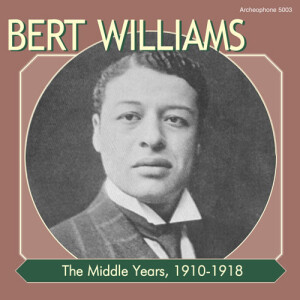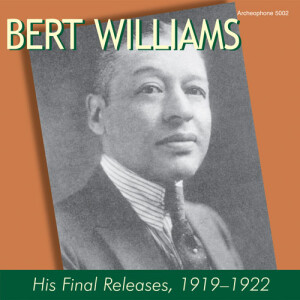 I know about Fanny Brice. Her portrayal of Brice in “Funny Girl” was the breakthrough that made Barbra Striesand a star. I know about W. C. Fields, and can recite many of his best-known lines in an approximation of his trademark leer. I can quote many of Will Rogers’ aphorisms, including “I don’t belong to any organized party, I’m a Democrat.” These and many others who appeared in the Ziegfeld Follies from about 1913 to 1920 have become household names, and many of them went on to be early movie stars.
I know about Fanny Brice. Her portrayal of Brice in “Funny Girl” was the breakthrough that made Barbra Striesand a star. I know about W. C. Fields, and can recite many of his best-known lines in an approximation of his trademark leer. I can quote many of Will Rogers’ aphorisms, including “I don’t belong to any organized party, I’m a Democrat.” These and many others who appeared in the Ziegfeld Follies from about 1913 to 1920 have become household names, and many of them went on to be early movie stars.
So why haven’t I heard of Bert Williams, the entertainer who played the Follies alongside all of the above, and was also an early star of silent films? The black entertainer, that is. Perhaps my question is answered.
Archeophone with these two releases has given us two-thirds of a planned trilogy of the complete recorded works of Bert Williams. These are as important as anything the label has released to date, in collecting, preserving and bringing to the modern public the work of this all-but-forgotten genius of the American stage, screen and studio.
These two discs contain 50 sides cut by Williams in the 13 years represented here. On most, Williams is billed as “comedian with orchestra accompaniment,” although several list him as “baritone with orchestra accompaniment” and a few as solo baritone or solo comedian. Nearly all of the recordings, and indeed all of the two-dozen he cut in 1919-22, are comic pieces of a racial nature.
It’s a tragedy that a talent of Williams’ caliber was restricted to playing the role of the shufflin’ darky, even if it was an act that he perfected. He longed to try his hand at dramatic roles, but at the time the prevailing wisdom was that white audiences wouldn’t accept a black man in any but a comic role.
All this and more is told in the comprehensive booklets that accompany these CDs, complete with photos taken from his stage routines and silent films.
 The recordings themselves are generally of a high quality. In most, Williams performs over an orchestra, which almost always heavily features the trombone and bassoon, two instruments used for comic effect. Williams has a beautiful baritone and whatever the medium, be it spoken word, song-speaking or singing, he delivers each word and line with impeccable timing and finely wrought emotion.
The recordings themselves are generally of a high quality. In most, Williams performs over an orchestra, which almost always heavily features the trombone and bassoon, two instruments used for comic effect. Williams has a beautiful baritone and whatever the medium, be it spoken word, song-speaking or singing, he delivers each word and line with impeccable timing and finely wrought emotion.
There are some real gems of songs here, especially on the “middle years” disc. Most of them could be the tale of any man of any time or color, although they almost always have a code-word or phrase here and there that identifies the protagonist as black. The bulk of the comic songs and many of the spoken pieces have to do with rocky marital relations: the generosity of the down-and-outer who sings “I’ll lend you anything,” — except his wife, and you can have her free; or the man who gets “something you don’t expect” from the wife who catches him stepping out on her; or the character who can scoot to the top of a “slippery ellum” tree when his wife is after him, in a hilariously droll monologue delivered over the strains of Irving Berlin’s “Woodman Spare That Tree.”
Williams’ biggest hit — the one that would become a blessing and a curse for the rest of his career, in the way of monster hits even today — is “Nobody.” The lyrics consist of a litany of wrongs suffered by a down-and-outer, set to a catchy melody that’ll have you humming it all day after you hear it just once. “When life seems full of clouds and rain/and I am full of nothin’ and pain/who soothes my thumpin’, bumpin’ brain? Nobody,” goes the first verse. Then with an upward slide of the trombone, he enters the chorus, “I ain’t never done nothin’ to noooo-body.” In the way of all the best comedy, it’s hilarious and heartbreaking at the same time, and such a fine piece of music that it was covered by Perry Como in the 1950s, and by Johnny Cash in 2002.
In addition to race humor and domestic relations, Williams also takes on America’s stance on the European Great War in “I’m Neutral”; and Prohibition in “Bring Back Those Wonderful Days,” “Everybody Wants a Key to My Cellar,” “Ten Little Bottles” and others. He had a number of popular comic routines featuring the rocky relations between a black preacher, “Elder Eatmore,” and his congregation and deacons. And he performs several blues-influenced numbers, including “I’m Sorry I Ain’t Got It You Could Have It If I Had It Blues,” “Unlucky Blues,” and “Lonesome Alimony Blues.”
The “Middle Years” booklet reproduces in its entirety a lengthy essay by Williams on his theory of humor and his explanation of “the comic side of trouble.”
The booklets also have several photos of Williams performing in blackface, and they feature many photos of him without it, both posed portraits and studio candids. These latter show a handsome, dignified man, and provide the juxtaposition that lets us understand the words of W. C. Fields: “Bert Williams is the funniest man I ever saw — the saddest man I ever knew.”
These Archeophone Bert Williams discs are a treasure trove of Americana and a heartfelt tribute to a neglected entertainer. I eagerly await the completion of the trilogy.
(Archeophone, 2001 and 2002)
(Note: Since this review was first published, Archeophone released the third disc in the trilogy, The Early Years, 1901-1909.)
